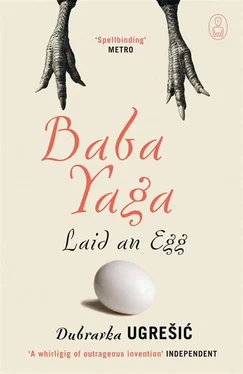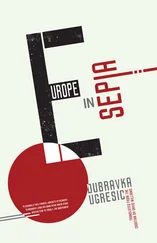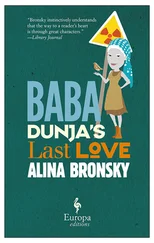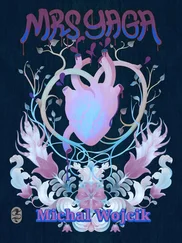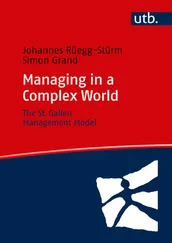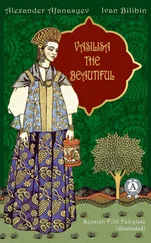With the white towelling robe draped over her naked body, Beba looked at herself in the mirror. Everything was hanging out, everything was old, everything was distorted, and only that ‘little bush’ down below, sprinkled with grey, was still luxuriant. Come now, why this idiotic pride in the ‘luxuriance’ of her ‘little bush’? As though it were treasure! As though the other parts of her body were police, accountants, porters – existing only in order to attend to the treasure! But what was this, why this sudden moralistic protest? Had not her ‘little bush’ been her ‘treasure’ for many years, had not everything revolved around sex for a major part of her life? When she was younger, she would have sold her soul to the devil for that, for the simple mechanism of the snap fastener. ‘Men and women are like snap fasteners’, one of her lovers had once said. She no longer recalled his name, but she remembered the sentence. At the time, she had found the image irresistibly comic. Click-clack! Click-clack! Now she felt it was inappropriate. But if she really thought about it, was there anything apart from that click-clack? Was everything else not mere fog to soften the truth and make the human snap-fastener mechanism appear less frighteningly simple? Of course, it was all a matter of perspective. Now it seemed to her that before, when she was younger, she used to think the opposite. She was prepared to die for that damned ‘snap fastener’.
Beba plucked at her ‘little bush’ down below in a desultory fashion. But just as she was about to go into the bathroom, it seemed to her for an instant that instead of that dry, greyish ‘bush’, she saw sleek, black feathers. Beba went up to the mirror and – oh my! – now it seemed that a bird’s eye was observing her from that place and, what is more, that gleaming, malicious bird’s eye was winking at her. ‘Shoo, you fiend!’ muttered Beba, and, wrapping her robe tightly round her, made her way to the bathroom.
What about us? We carry on. While life can at times be hard and rough, the tale shies away from anything tough.
Mr Shaker, who was lying on the stone massage table, pasted with soapy foam like a car in a carwash, saw it at once: the young man could have been Clooney’s son. Olive skin, large, dark eyes, but a fuller and more finely shaped mouth, a natural smile, which did not, like Clooney’s, end in a fan of lines at his temple. And he was far taller than Clooney! But why was he so stuck on Clooney? The young man was simply good-looking and would appeal to both women and men, regardless of their age, which, from a marketing perspective, was the key. And those wide oriental pants, imposingly taut in the right place, hinted that the rumours of the young man’s sexual prowess may have been well-founded.
‘Hi, mai neym iz Suleiman. I em yor maser!’ muttered the young man through his teeth.
‘Hi! I’m Mr Shaker,’ said the American warmly, offering the young man his hand, but he did not manage to shake it. The young man pinned him to the table with a deft movement of his arm.
‘Reeleks!’ said the young man.
The young man’s dreadful English would not be a problem, thought Mr Shaker, he was bright, he’d learn the language… Mr Shaker squirmed nervously on the massage table. The foam was suffocating him, and he felt extremely uncomfortable in that whole soapy set-up.
‘Where are you from?’ he asked the young man.
‘Sarajevo,’ snapped the young man.
This information stimulated Mr Shaker’s business imagin ation. The young man was Bosnian; that should be exploited! Because, for instance, Havel and the Czechs didn’t mean anything any more to the average American. But Sarajevo still rang in the average American ear. Or more accurately, Mr Shaker hoped that it still rang.
‘Listen,’ Mr Shaker tried to lever himself up, but the young man glued him back to the table.
‘Reeleks!’ said the young man and began massaging the vertebrae of the American’s neck.
At a certain moment the young man’s attention lapsed and Mr Shaker flapped like a tuna and straightened up to a sitting position.
‘Listen, young man, there’s been a misunderstanding, I didn’t come here for a massage, but to offer you a job.’
The young man listened to the middle-aged American in amazement. He was quite baffled. ‘Could he be gay?’ he wondered. All that he managed to grasp from the American’s tirade were figures: tventi tausand, then fifti tausand, then hundrd tausand, then hundrd tventi tausand…
‘What’s he on about? I don’t get a word of it,’ grumbled the young man in Bosnian. ‘Are you listening to me? He’s not listening, why should he, Yanks never listen, they just press on with their own agenda. Leave me alone, I’ve already been called by the Viagra people… Oh, but you, you don’t give up, you’re like NATO! Why didn’t you come when they were shelling Sarajevo, and when that bomb exploded near me, instead of coming to harass me now?’
‘I have to find an interpreter! Yes, an interpreter,’ said Mr Shaker resolutely. He leapt from the table and, almost slipping, ran out of the massage room.
‘What a performance! What will these idiots think of next?… Hey, my Mevlo, what else have these hulks got in store for you?’ sighed the young man.
* * *
What about us? We carry on. While life may beguile and tempt like a gift, the tale is decisive and above all swift!
Kukla went down to the hotel computer for a moment, to check the Croatian newspapers on the Internet. She could have done this in her room, but she felt like stretching her legs. At home she amused herself every day leafing through local and foreign newspapers. The Croatian one she usually took was The Morning News . Its format was predictable: embezzlement, corruption, quarrels between political parties and their opponents, articles about the unjust conviction of ‘Croatian heroes’ by the Hague Tribunal, financial scandals involving people who had earned small fortunes through Croatian patriotism and the war. Kukla clicked on the cultural section and was surprised to see a fairly lengthy review of Bojan Kovač’s new novel Desert Rose .
The novel Desert Rose by Bojan Kovač will disappoint all those who think that it has any connection with Sting and Cheb Mami’s ‘Desert Rose’, or with popular romances , said the article. Kukla hadn’t a clue who Sting and Cheb Mami were so for a moment their names sounded threatening, but the way the review went on cheered her. Desert Rose is the greatest event on the Croatian literary scene for the last fifteen years, if not longer , the review went on. It is a book through which this prematurely deceased Croatian classic writer has earned the right to a second life and places himself at the very peak of Croatian literature. The novel of unusual structure, reminiscent of a rose, is rooted in the deposits of time, the biographies of ordinary people, reality and dreams, essayistic and fictional passages which treat events from the recent wartime past, from contemporary Croatian reality, and the time of the Second World War. A novel left as a legacy by a writer who lived in the shadows, far from the lights of the literary stage, is a great lesson for today’s instant products of the literary-entertainment industry. This unusual book is like a solitary rose blooming in the desert of Croatian literature.
The Evening News announced that a review of this ‘ first class work by Bojan Kovač’ would appear in the Sunday edition, while a weekly magazine advertised ‘ a masterpiece of Croatian literature on a par with Marquez’s novel One Hundred Years of Solitude.’
Читать дальше
